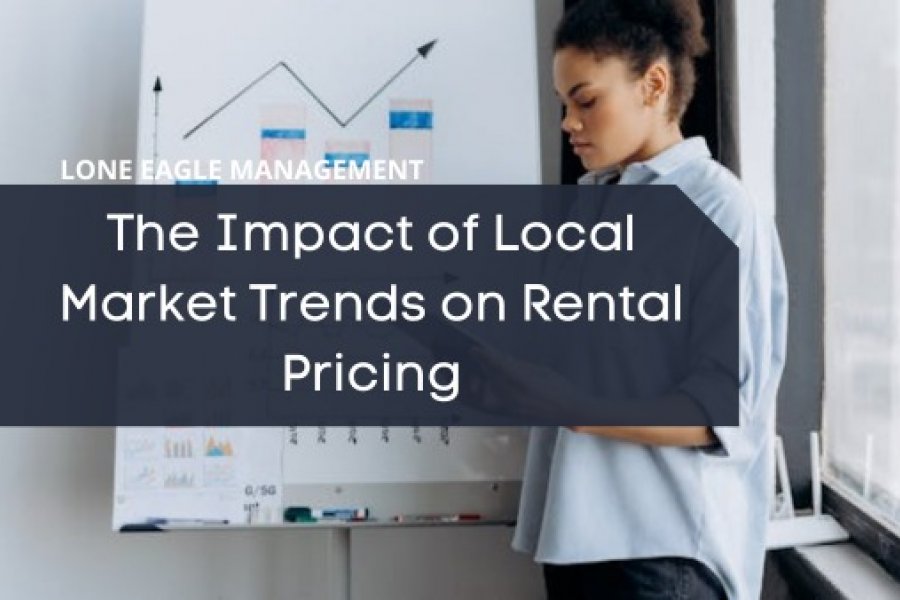
Have you ever wondered why rental prices in your neighborhood suddenly rise or fall, even when your property has not changed? Many landlords in New Jersey face this question every year.
The local real estate market is dynamic, and understanding what drives it can make a major difference in your rental income and long-term returns.
The truth is, the local housing market affects everything from tenant demand to property value. When market conditions shift, rental pricing often shifts with them. Recognizing these patterns can help landlords make informed decisions and avoid financial surprises.
Lone Eagle Management put together this article to help New Jersey landlords understand how local trends shape rental pricing and what can be done to stay competitive.
Learn How We Can Help You Maximize Your Home’s Potential!
Getting to Know the Local Real Estate Scene
The New Jersey real estate market is influenced by a mix of local and regional conditions. Urban areas like Jersey City and Newark often move differently from suburban or coastal regions such as Princeton or Long Branch.
In cities, job growth, redevelopment projects, and transportation options can drive demand for rentals. In suburban areas, friendly neighborhoods, nearby amenities, and commuting convenience often play a bigger role.
Seasonal changes also affect the market. Demand tends to rise in the spring and summer when people prefer to move, while the winter months often bring slower activity.
Landlords who adjust their marketing and pricing based on these cycles are more likely to attract quality tenants and maintain steady occupancy rates which translates to steady cash flow.

Keeping an eye on neighborhood developments, infrastructure upgrades, and local business growth is another way to stay informed. When new employers move into an area or when a new transit line opens, rental demand typically increases.
This heightened demand can improve occupancy rates and strengthen your property’s cash flow over time.
What Shapes Our Local Housing Market
Several key factors influence the direction of the housing market in New Jersey. The most noticeable are supply and demand, interest rates, and population trends.
1. Supply and Demand
When more renters are looking for homes than available properties, rental prices naturally increase. This situation has been common in many New Jersey cities where development cannot always keep up with demand.
On the other hand, when new apartment complexes or housing developments open in a small area, landlords might face increased competition, which can put downward pressure on prices.
Discover More About Lone Eagle Management!
2. Interest Rates
When interest rates rise, some potential homebuyers postpone purchasing and continue renting instead. This shift can increase rental demand, especially in high-cost markets like Hoboken or Montclair. Conversely, when mortgage rates drop, some renters become buyers, slightly reducing rental demand.
Population and Employment
New Jersey’s proximity to major employment hubs like New York City and Philadelphia keeps its rental market strong. Population growth, job creation, and economic stability all attract more renters.
Areas with expanding universities, hospitals, or corporate centers often experience steady rental demand because of the constant flow of a variety of renters.

How the Market Impacts Rental Prices
Rental pricing reflects how well landlords respond to the market’s movements. If demand rises faster than supply, landlords can increase rent without losing tenants. When demand slows, landlords may need to adjust pricing or offer incentives to attract renters.
Property Taxes
In New Jersey, property taxes are a significant expense and often influence rental pricing. When taxes increase, landlords may choose to raise rent to offset costs. Utility costs, insurance, and maintenance expenses also factor into rent calculations.
However, tenants are becoming more value-conscious, so landlords need to balance competitive pricing with property improvements and upkeep.
2. Vacancy Rates
High vacancy rates in a neighborhood often mean rents are set too high for the current market. Low vacancy rates suggest there is strong demand, giving landlords more flexibility in pricing.
Monitoring these trends helps landlords make informed decisions about when to adjust rent or invest in upgrades that can justify higher rates.
Reach Out to Our Team!
3. Tenant Expectations
Renters today often look for updated features such as energy-efficient appliances, modern finishes, and secure online payment options. Meeting these expectations can make a property more appealing and allow landlords to maintain competitive pricing even when the broader market is uncertain.
How Lone Eagle Management Helps Set Fair Rental Values
Setting the right rental price takes more than comparing nearby listings. It requires insight into the local market, property condition, and tenant demand. At Lone Eagle Management, we combine data-driven analysis with local expertise to help New Jersey landlords set fair and profitable rental rates.

We conduct detailed market comparisons, review rental trends, and consider each property’s unique qualities, such as location, size, and recent upgrades. This ensures accurate pricing from the start, helping reduce vacancies and increase returns.
Beyond pricing, Lone Eagle Management handles marketing, tenant screening, leasing, and maintenance. Our full-service approach helps landlords maintain steady income, protect their investments, and remain compliant with New Jersey’s landlord-tenant laws.
Discover Our Property Maintenance Services!
Bottom Line
The local real estate market has a direct impact on rental pricing. Factors such as supply and demand, interest rates, population trends, and regional development all play a role in shaping what tenants are willing to pay.
Landlords who understand these trends can better position their properties to attract reliable tenants and maintain steady income.
Lone Eagle Management helps landlords across New Jersey navigate these changing market conditions with confidence. Our expertise in local property management and market analysis ensures your rentals remain competitive, compliant, and profitable.
To learn how we can help you set the right rent and manage your property more efficiently, contact Lone Eagle Management today for a consultation.